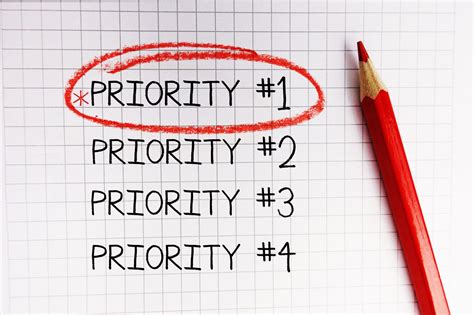Do you often find yourself overwhelmed by the never-ending tasks and deadlines that consume your days? Are you constantly searching for ways to accomplish more in less time? Look no further–this article will unveil a treasure trove of strategies to help you regain control over your schedule and maximize your efficiency.
Time management is not just about saving time; it's about making the most out of the valuable hours we have in a day. By developing effective time management skills, you can enhance your productivity, reduce stress, and ultimately achieve your goals with greater ease. This comprehensive guide will equip you with practical tips and invaluable insights to revolutionize the way you approach your daily tasks.
Harnessing the powers of prioritization and focus
One of the fundamental principles of effective time management is prioritization. It involves identifying the tasks that are most important and require immediate attention. By distinguishing between urgency and importance, you can allocate your time and energy to the tasks that will yield the most significant results.
Moreover, learning to cultivate focus is indispensable in the journey towards mastering time management. In today's fast-paced world, distractions are constantly vying for our attention, hijacking our productivity. By training yourself to stay focused on the task at hand, you can eliminate unnecessary detours and accomplish your objectives more efficiently.
Prioritize Your Tasks

Organizing and categorizing your daily responsibilities is essential for effective time management. By assigning priorities to your tasks, you can streamline your workflow, increase productivity, and achieve your goals more efficiently.
| 1. Determine Urgency | Identify tasks that require immediate attention or have strict deadlines. These are the most urgent and should be prioritized accordingly. |
| 2. Assess Importance | Evaluate the significance of each task in relation to your overall objectives. Focus on high-priority tasks that align with your goals and contribute to long-term success. |
| 3. Consider Impact | Take into account the impact each task will have on your projects, team members, or stakeholders. Prioritize tasks that have the potential to create positive outcomes or prevent potential issues. |
| 4. Break Down Complex Tasks | If you have large or complex tasks, break them down into smaller, manageable subtasks. Prioritize these subtasks individually to tackle them effectively and avoid feeling overwhelmed. |
| 5. Evaluate Time Constraints | Consider the amount of time needed to complete each task. Prioritize tasks that require significant effort or have tight deadlines to ensure they receive adequate attention. |
| 6. Re-evaluate Regularly | Regularly review and adjust your task priorities based on changing circumstances or shifting priorities. This flexibility allows you to adapt to unexpected changes efficiently. |
By assigning priorities to your tasks using the outlined strategies, you can optimize your time management approach and achieve greater efficiency and productivity in your daily endeavors.
Setting Clear and Attainable Objectives for Optimal Time Management
In today's fast-paced world, achieving success and maintaining productivity hinges greatly on effective time management. To make the most of your time and boost efficiency, it is essential to set clear and achievable goals. By defining specific objectives, you can prioritize tasks, stay focused, and maximize your productivity.
Here are some steps to help you set clear and attainable goals:
- Reflect on your priorities: Begin by assessing your overall priorities and long-term objectives. Consider what truly matters to you in various aspects of your life, such as career, personal growth, relationships, and well-being. This will enable you to set goals that align with your values and aspirations.
- Break it down: Once you have identified your priorities, break them down into smaller, more manageable goals. This will allow you to tackle one step at a time, keeping you motivated and providing a sense of progress.
- Be specific: Clearly define your goals and ensure they are specific rather than vague. By stating exactly what you want to achieve, you will have a clear target to work towards.
- Make them measurable: Establish concrete criteria to measure your progress and track your accomplishments. This will help you stay accountable and make adjustments if needed.
- Set realistic deadlines: Consider the timeframes in which you wish to complete your goals. It is important to set deadlines that are both challenging yet attainable, as this will help you stay focused and motivated.
- Prioritize: Determine the order in which you will tackle your goals by assessing their importance and urgency. Prioritizing will ensure you focus on the most significant tasks first, maximizing your efficiency.
- Stay flexible: Recognize that circumstances may change, and it is essential to remain adaptable. Stay open to making adjustments to your goals when necessary, while still keeping the end result in mind.
- Celebrate milestones: Acknowledge and celebrate your achievements along the way. This will boost your motivation, provide a sense of accomplishment, and reinforce your commitment to achieving your goals.
By setting clear and achievable goals, you can effectively manage your time, increase productivity, and ultimately work towards a more fulfilling and successful life.
Create a Daily Schedule

Incorporating a structured daily schedule is a fundamental element in achieving optimal time management and boosting overall productivity. By carefully planning and organizing your day, you can efficiently utilize your time and accomplish tasks effectively, allowing you to stay focused and motivated throughout the day.
Establish Priorities: Start by identifying your most important tasks or goals for the day. Prioritize them based on urgency and significance. This will help you allocate your time and energy accordingly, ensuring that the essential tasks are completed first.
Break it Down: Once you have identified your priorities, break them down into smaller, manageable tasks. Breaking down bigger tasks into smaller steps not only makes them less overwhelming but also provides a clearer roadmap, enabling you to approach them more efficiently.
Create Time Blocks: Allocate specific time frames for each task or group of related tasks. This helps create structure and focus, reducing the likelihood of getting distracted or overwhelmed by multiple responsibilities simultaneously. Be realistic when estimating the time needed for each task to avoid overloading your schedule.
Utilize Tools and Technology: Leverage various productivity tools and technologies to aid in creating and maintaining your daily schedule. Online calendars, task management apps, and reminders can help you stay organized and accountable. Experiment with different tools and find the ones that work best for you.
Include Breaks: Remember to incorporate short breaks into your schedule. In addition to preventing burnout, taking regular breaks can enhance your focus and productivity. Use these breaks to relax, rejuvenate, and engage in activities that help clear your mind.
Be Flexible: While having a schedule is crucial, it is essential to remain adaptable. Unexpected events and priorities may arise throughout the day, requiring adjustments to your plan. Embrace flexibility and be prepared to rearrange your schedule if necessary, while still prioritizing your key tasks.
Reflect and Review: At the end of each day, take some time to reflect on the outcome and review your schedule. Assess what worked well, what could be improved, and make necessary adjustments for future scheduling. Reflecting and reviewing allows you to continuously refine and optimize your daily schedule for maximum efficiency.
Incorporating an effective daily schedule sets the foundation for successful time management and increased productivity. By prioritizing, breaking tasks down, creating time blocks, utilizing tools, including breaks, being flexible, and reflecting on your schedule, you can take control of your time and accomplish your goals effectively.
Minimize Distractions
In today's fast-paced world, staying focused and managing time efficiently can be a challenging task. In order to enhance productivity and achieve our goals, it is important to minimize distractions that can hinder our progress and disrupt our workflow.
Avoiding interruptions: Find ways to limit interruptions in your work environment. Put your phone on silent mode, close unnecessary browser tabs, and set boundaries with colleagues to minimize distractions and create an uninterrupted workflow.
Creating a conducive workspace: Design a workspace that promotes concentration and focus. Keep it clean and organized, eliminating clutter that can be visually distracting. Surround yourself with minimal decor and create a comfortable environment that encourages productivity.
Scheduling focused work sessions: Set aside dedicated blocks of time for focused work. During these sessions, eliminate any potential distractions and concentrate solely on the task at hand. Consider using productivity techniques such as the Pomodoro Technique, which involves working in short bursts with regular breaks to maintain focus.
Utilizing time management tools: Take advantage of various time management apps and tools available to help minimize distractions. Use applications that block access to social media or websites that often divert your attention. Set up reminders and alerts to stay on track and manage your time effectively.
Establishing boundaries: Communicate your need for uninterrupted focus with those around you. Establish clear boundaries and let others know when you need uninterrupted time to work. This will help minimize interruptions and distractions, allowing you to maximize your efficiency and productivity.
By implementing strategies to minimize distractions, you can optimize your time management efforts and enhance your overall productivity. Remember, staying focused and reducing disruptions is essential in achieving your goals and completing tasks effectively.
Delegate to Enhance Performance: Master the Art of Delegating

Discover the secret behind maximizing your efficiency and productivity by embracing the power of delegation. Delegation is an essential skill that allows you to assign tasks and responsibilities to others, enabling you to focus on high-priority activities and make the most of your time.
Embrace Collaboration: Instead of shouldering all the workload yourself, tap into the potential of your team members or colleagues. Recognize that by delegating tasks to others, you create opportunities for collaboration, knowledge sharing, and skill development. Effective delegation fosters a sense of empowerment and fosters a culture of teamwork.
Clear Communication is Key: When delegating tasks, it is crucial to provide clear instructions and expectations to ensure successful outcomes. Clearly communicate the desired outcomes, deadlines, and any specific guidelines or requirements. Be available for clarifications and provide the necessary resources or support to ensure the smooth execution of delegated tasks.
Assemble the Right Team: When delegating tasks, consider the strengths and expertise of your team members. Assign tasks to individuals who have the necessary skills and knowledge to complete them effectively. By leveraging the strengths of your team, you can ensure that each task is handled by the most suitable person, ultimately enhancing overall performance and productivity.
Trust and Empowerment: Delegation is not just about giving away tasks; it is about entrusting others with responsibilities and empowering them to take ownership. Be willing to relinquish control and have faith in the capabilities of your team. Trusting your team members fosters a positive work environment and encourages personal and professional growth.
Monitor Progress and Provide Feedback: While delegating tasks, it is crucial to stay involved and monitor the progress. Regularly check-in to ensure that the delegated tasks are on track and provide feedback and guidance along the way. This allows for timely adjustments and corrections, ensuring the successful completion of tasks.
Learn and Improve: Delegation provides an excellent opportunity for personal and professional growth. Reflect on your delegation practices, analyze the outcomes, and identify areas for improvement. By continually enhancing your delegation skills, you can refine your decision-making, and effectively allocate tasks to optimize time management and productivity.
Mastering the art of delegation is a valuable skill that not only enhances your own effectiveness but also cultivates the potential of those around you. By learning to delegate effectively, you can unlock new levels of productivity, foster collaboration, and achieve your goals with confidence.
Take Care of Yourself and Prioritize Rest
In order to excel in managing your time effectively and boosting your overall productivity, it is essential to prioritize self-care and ensure that you allocate enough time for rest. It is crucial to recognize that our minds and bodies function best when they are well-rested and rejuvenated, allowing us to perform at our peak potential.
One key aspect of practicing self-care is to establish healthy boundaries in your daily schedule. This involves setting aside dedicated time for activities that replenish your energy, such as engaging in hobbies, spending quality time with loved ones, or simply taking a few moments to relax and recharge.
Additionally, incorporating regular breaks throughout your workday can also make a significant difference in your efficiency and well-being. Taking short breaks to stretch, walk around, or engage in mindfulness exercises can help clear your mind, reduce stress, and maintain focus when you return to your tasks.
Another important aspect of self-care is ensuring you get enough sleep each night. Adequate sleep is fundamental for cognitive function, memory consolidation, and maintaining good physical health. Prioritize a consistent sleep schedule and create a relaxing bedtime routine to enhance the quality of your sleep.
Finally, don't forget to allocate time for physical exercise in your schedule. Engaging in regular exercise has numerous benefits for both your physical and mental well-being. It can boost your energy levels, improve concentration, reduce stress, and enhance your overall mood, all of which contribute to better time management and increased productivity.
By prioritizing self-care and making time for rest in your daily routine, you will not only optimize your time management skills but also improve your overall well-being. Remember that taking care of yourself is a crucial component of achieving long-term success and maintaining a healthy work-life balance.
FAQ
How can I effectively manage my time and maximize efficiency?
To effectively manage your time and maximize efficiency, you need to prioritize tasks, set goals, and create a schedule. Start by identifying your most important tasks and work on them first. Break down larger tasks into smaller, more manageable ones. Set specific goals and deadlines to stay focused. Lastly, create a schedule or use a time management tool to organize your tasks and allocate appropriate time for each.
What are some strategies for improving productivity?
There are several strategies you can adopt to improve productivity. Firstly, eliminate distractions by turning off notifications on your phone or computer and finding a quiet workspace. Secondly, practice the "two-minute rule" – if a task takes less than two minutes to complete, do it immediately instead of putting it off. Thirdly, take regular breaks to refresh your mind and prevent burnout. Lastly, prioritize tasks based on urgency and importance, and focus on one task at a time to avoid multitasking.
How can I overcome procrastination and manage my time effectively?
To overcome procrastination and manage your time effectively, start by breaking tasks into smaller, more manageable parts. This makes them seem less overwhelming and easier to start. Set specific goals and deadlines for each task to create a sense of urgency. Additionally, eliminate distractions and create a conducive work environment. If you find yourself procrastinating, try using productivity techniques such as the Pomodoro Technique, where you work for 25 minutes and then take a short break.
Is it important to prioritize tasks when managing time effectively?
Yes, prioritizing tasks is crucial for effective time management. By prioritizing, you ensure that important tasks are completed on time and that your efforts are focused on the most impactful activities. Start by identifying tasks that align with your goals and have the highest priority. This helps you avoid wasting time on less important tasks and ensures that you allocate your time and energy effectively.
What are some common time management mistakes to avoid?
There are a few common time management mistakes to avoid. One is failing to prioritize tasks, which can lead to spending too much time on less important activities. Another mistake is overcommitting and trying to do too much, which can result in feeling overwhelmed and not delivering quality work. Procrastination is another pitfall to avoid, as it leads to unnecessary stress and the risk of missing deadlines. Lastly, not taking breaks and burning out can also hinder productivity and time management.



